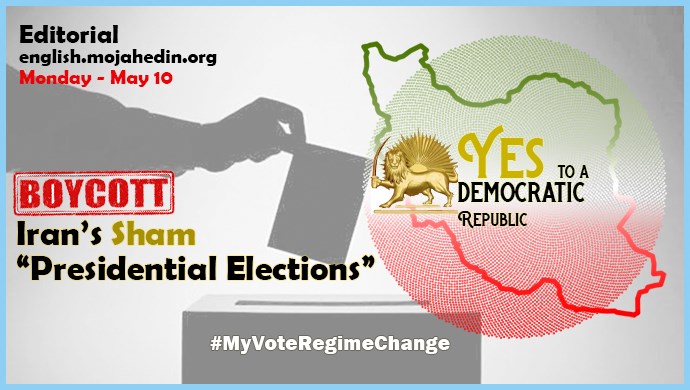This article is part of our coverage of the Iranian regime’s June 18 presidential elections
Iran, May 10, 2021—The upcoming sham presidential elections in Iran, scheduled for June 18, have turned into a major crisis for the regime. Tuesday is the official deadline for registration for the elections. But none of the main candidates are certain about participating.
On May 2, regime Supreme Leader Ali Khamenei expressed concerns about a low voter turnout, signaling his regime’s main obstacle. “Nothing replaces elections for the country and the strength of the foundations of the country's authority. People should not be discouraged from it,” he emphasized.
Back in March, Khamenei warned of division and polarization among the regime’s factions, going on to voice his preference for a “young and hezbollahi” government and a “Qassem Soleimani–like” president.
During the past week numerous state-run media outlets acknowledged the possibility of a low election turnout.
On May 3, the daily Javan affiliated to the Islamic Revolutionary Guard (IRGC) wrote, “The main polarization that the enemy has designed for the Iranian nation in the 2021 elections is the decision to vote or not to vote."
This confirms the historic confrontation between the regime and the Iranian people, who demand change. The daily Arman wrote on May 5, “Encouraging people to participate in elections requires a miracle. In fact, the upcoming election is more than a simple vote and could even be considered a referendum. Therefore, participation or non-participation in it must be with the understanding and acceptance of this presupposition. There is no doubt that the Islamic Republic as a political system is facing a crisis due to its many internal and external dilemmas and its 40-year report card. This crisis has significant consequences in reducing the people’s participation in the elections. Let us be vigilant and think that today the lack of public trust in the government is alarming. It seems that a miracle is needed for a serious turnout, even if reformist candidates participate."
It is worth noting that following the bloody crackdown of the nationwide November 2019 protests based on Khamenei’s orders, voter turnout for the regime’s 2020 legislative election was the lowest since the 1979 revolution.
In this regard the daily Etemad warned on May 2, “It seems that public eagerness to participate in the election has not changed much since the 2020 (legislative) elections."
“We are facing a unique situation never experienced before and is occurring for the first time in our post-revolutionary history. Something we witnessed in last year's parliamentary elections was a 42 percent drop in voter turnout,” wrote the daily Sharq on May 3.
In such circumstances, the main so-called candidates from both regime factions haven’t announced their candidacy because they fear humiliation.
Khamenei’s main candidate is clearly Ebrahim Raisi, the regime’s current Judiciary Chief. However, he has yet to officially announce his candidacy. He is known for his leading role in the 1988 massacre, in which Iranian authorities executed 30,000 political prisoners. Raisi was a key member of the “death commissions,” a trio of regime officials that summoned each political prisoner and sealed their fate in trials that lasted no more than a few minutes.
Raisi fears becoming the most unpopular president in the regime’s history because of the people’s unwillingness to participate in the election. Also, due to Khamenei’s health problems, Raisi is a serious candidate to be his successor.
Moreover, inside the regime’ power struggles, the so-called reformist current wants to nominate Mohammad Javad Zarif, the regime’s current Foreign Minister. However, Zarif’s leaked audio recording has only added to the regime’s internal crises. Zarif acknowledged in a seven-hour interview that the Revolutionary Guards (IRGC) dominates the regime’s foreign and domestic policies. The question is whether Zarif can run for the regime’s presidency or not.
The situation is rendered even worse by growing calls across the Iranian society to boycott the elections. In recent weeks, many segments of the Iranian society have declared their lack of interest in voting through weekly protests. On May 1, workers took to the streets in more than 20 cities and cast their early votes on the regime’s upcoming presidential elections with the slogans “We will not vote, we’ve heard too many lies” and “Every worker must boycott the elections.”
In parallel fashion, the Iranian opposition People’s Mojahedin Organization of Iran (PMOI/MEK) network continued its vast campaign across the country against the mullahs’ sham elections. Last week, the internal MEK network, known as the Resistance Units, held anti-regime activities in more than 60 areas of 23 cities across Iran. Their activities portray the Iranian people’s desire for regime change.
Therefore, the upcoming presidential elections have become a major complication for the regime. On one hand, the ongoing power struggle between various factions has weakened Khamenei’s position and authority. On the other hand, forecasted low voter turnout has made the regime’s main candidates reluctant to officially announce they will be running in the race.
Tuesday is the official candidate registration deadline. As many officials have acknowledged, this is the regime’s most important election in history and will determine its fate. But for the people of Iran, this is a masquerade, not an election.
- No one outside the ruling factions has the right to engage in political activity in Iran.
- The Guardian Council, tasked to vet the candidates, is comprised of 12 members, six of whom are appointed by Khamenei, and the remaining six by the Judiciary chief, who is himself appointed by Khamenei. The main condition before each candidate is practical loyalty to the regime’s supreme leader.
- Since the people refuse to vote, the so-called election process is engineered. Therefore, the outcome is not determined by the ballot box but reflects the balance of power within the regime’s internal factions.
As a result, the planned elections are expected to be widely boycotted and the Iranian people have already announced their choice as “regime change” and “yes to a democratic Iran.”





